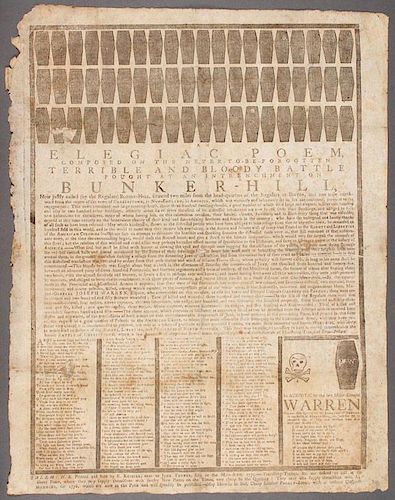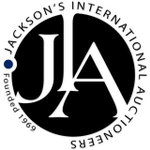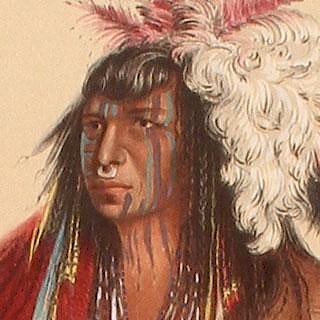RARE AMERICAN REVOLUTIONARY WAR BROADSIDE, 1775
About Seller
2229 Lincoln Street
Cedar Falls, IA 50613
United States
Founded in 1969, Jackson’s International Auctioneers and Appraisers has grown to become one of the nation’s premier service providers for the sale and appraisal of antiques and fine art. Our regularly scheduled auctions bring to market a broad array of objects, including Russian icons, Old Master pa...Read more
Two ways to bid:
- Leave a max absentee bid and the platform will bid on your behalf up to your maximum bid during the live auction.
- Bid live during the auction and your bids will be submitted real-time to the auctioneer.
Bid Increments
| Price | Bid Increment |
|---|---|
| $0 | $10 |
| $100 | $25 |
| $500 | $50 |
| $1,000 | $100 |
| $2,000 | $200 |
| $5,000 | $500 |
| $10,000 | $1,000 |
About Auction
Jun 16, 2015 - Jun 17, 2015
Jackson's International Auctioneers and Appraisers accounting@jacksonsauction.com
- Lot Description
AN EXCEEDINGLY RARE AMERICAN REVOLUTIONARY WAR BROADSIDE “BATTLE OF BUNKER HILL”, E. RUSSELL, SALEM, 1775. “An Elegiac Poem Composed on the Never-to-be-Forgotten Terrible and Bloody Battle Fought at an Intrenchment on Bunker-Hill, now justly called (by the Regulars) Bloody-Hill”. Woodcut mourning border enclosing 60 woodcut coffins at head, following a six line title, 31 lines of text, four column elegy and an acrostic poem on General Joseph Warren surmounted by a woodcut skull-and-crossbones and a large woodcut coffin with initials “J W” at foot and details the movements and casualties of the celebrated encounter and calling local patriots to assistance. 15.5 inches x 19.75 inches.
Provenance:
Sotheby’s July 1987.The above lot is possibly one of only three surviving copies to exist. Of copies known in public record, only two other known copies exist, one at the Massachusetts Historical Society and the other at The Rosenbach Foundation. While another is mentioned in “American Book Prices-Current”, 1919, E.F. Dutton Co. page 814, from the Goodell Collection sold by C.F. Libbie and Company, Mar. 5th, 1918 - this may possibly the broadside now residing at the Massachusetts Historical Society. Existence of these broadsides was relatively unknown until one surfaced in 1850 as noted in Littell’s Living Age, No. 322, July, 1850:
“The discovery of a new and very interesting document on Bunker Hill Battle when everything on the subject seemed completely exhausted must be exceedingly gratifying to every American. It is the only copy ever seen by any one living so far as we know of a large folio sheet headed with sixty cuts of coffins and contains an elegiac poem on the battle with some prefatory historical remarks and an acrostic on General Warren. It was published at Salem in 1775 by the father of the late NP Russell Esq., Ezekiel Russell, who left Boston. The poetry of this and other similar hand bills especially one on Lexington Battle seems to have been by Mr. Russell's wife who used to assist him in his printing.”
The account given in the offered Broadside- “as accurate a detail as can be collected from the different advices received from Boston and elsewhere”- conforms almost exactly with modern historical versions of the battle. “This bloody battle was fought about four o’clock in the afternoon of Saturday the seventeenth of June, [1775], between an advanced party of seven hundred Provincials, and fourteen regiments and a train of artillery, of the Ministerial forces, the former of whom after bearing about two hours, with the utmost fortitude and bravery, as severe a fire as perhaps ever was known, and many having fired away all their ammunition, they were over-powered by numbers, and obliged to leave the intrenchments, with three pieces of cannon, and retreat about sun-set to a small distance over Charles-town-neck.” The casualty figures were (not surprisingly) optimistic, exaggerating the heavy British losses from about 1,050 to 1,450, and minimizing the Americans killed and wounded from about 440 to 324. The text further details the deprivation of citizens made refugees by the destruction of Charlestown, and praises the “benevolent charity” of those Colonists who provided shelter, food, and clothing for those in distress. The broadside also predicts with accuracy the likely historical legacy of the battle: “the relation of this wicked and cruel affair may perhaps hereafter afford matter of speculation to the Historian, and serve to fill many pages in the history of America.”
The appended elegy is approximately less temperate than the prose report, and provides an early example of the American view of the battle as a Pyrrhic victory for the British and a moral victory for the cause of Independence: “A fort was late erected at / A place call’d Bunker-Hill, / Where thousands of fierce Regulars / Our people sought to kill. … / A hostile, bloody ‘trench it was, / The Regulars all say, / Tho’ they exultingly rejoice / That they have won the day. / A dear-bought victory they gain’d, / If it is called so, / When most the flower of British troops / Met with their overthrow. / Small was our loss compar’d with those / Who now the lines possess; / Great was the slaughter of our foes, / And poor was their success.”
Published by Ezekiel Russell (1743-1796), who was also the printer of record for another known broadside “Bloody Butchery by the British Troops”. The Salem, Massachusetts printer who published the Salem Gazette and Newbury and Newbury-Port Advertiser was also known to have printed an early copy of the Declaration of Independence at his print shop (circa July 14-16, 1776). Russell was from Boston, where in 1771 he published a small paper called “The Censor”. In 1773, he printed a handbill entitled “The Tradesman’s Protest against the proceedings of the Merchants relative to the new Importation of Tea.” This handbill excited so much feeling among the patriotic merchants that at a town hall meeting the printer (and authors) were pronounced as “detestable”. After the Salem Gazette failed, Russell started another paper titled “The American Gazette or The Constitutional Journal”. It was published during the Revolution, commencing June 19, 1776 and closing a few weeks later. Mr. Russell then moved to Danvers, and printed there a few years, then returned to Boston. There he continued in the printing business until his death in 1796, at the age of 52. Numerous publications purport that Mr. Russell’s wife (Sarah) was the “better half” of his family, assisting as the practical printer in his office, composing popular ballads for publication and later assuming the business after his death. - Shipping Info
-
All successful absentee bidders may request a shipping quote for Jackson’s International to provide shipping to be sent with their invoice. This shipping quote includes the cost of standard shipping as well as charges for materials and labor. Please indicate any special shipping instructions on the bid form. Purchases paid by personal check will not be shipped until funds have cleared Auctioneer's bank. Please note that International shipping is not available for ivory items. These items will only be shipped within the United States, except to California, Connecticut, New Jersey, and New York. All buyers agree to comply with any additional restrictions regarding the trade of endangered species as a condition of sale. It is the purchaser’s responsibility to obtain any licenses and/or certificates as well as any other required documentation prior to shipment. In the case of denial or delay of any required documentation or paperwork, they buyer will still be responsible for making on-time payment for the total purchase price of the lot. Therefore, if you are unsure, Jackson’s recommend that you DO NOT BID on ivory items. We support the ban on the sale of non-antique carved ivory objects of art.
-
- Buyer's Premium



 EUR
EUR CAD
CAD AUD
AUD GBP
GBP MXN
MXN HKD
HKD CNY
CNY MYR
MYR SEK
SEK SGD
SGD CHF
CHF THB
THB











